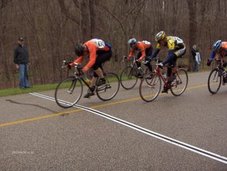This is a first... all my other writings have been about races. But I think this really need to be communicated. What does it mean? Am I guilty? Well, beginning riders are almost certainly guilty, and experienced riders will also do silly things when the going gets rough.
I started racing on my mountain bike. I heard about a race, I had a bike. I signed up for everything. Cross country race, downhill and trials. I'd never done any of them, but it's a bike thing. I've been riding my bike since I was 5, how hard can it be? Training? None, I was riding to work about once a week for maybe 30 miles both ways. I'd ridden trails and had a blast, so let's try some competition.
Imagine my surprise when I saw the skills required to do trials. How fast guys were flying down that hill... and I got shellacked in the cross country race. I was definitely hooked and immediately knew I had a ton to learn. When I picked up road racing, I wanted to learn first. I started by looking at what other people were writing about their races. That's why I write, to give yet another view of what goes on in a race. I'm still learning, and I still do really stupid things. My goal is to only do stupid things that don't hurt anyone.... including me.
Riding in a race or with a group is an act of trust. Just like driving your car on the freeway, we trust everyone else on the road to not do anything stupid. That's why there are driving laws and test for getting your drivers license. We expect everyone on the road to drive "close" to the speed limit, to obey direction laws and to turn right from the right lane, and left from the left lane.
Sitting in a group of cyclists is no different. We expect the riders around us to be stable. If you ride next to someone that is a bit wobbly, you give them more space so they won't wobble into you. In a race, it's even worse because just about everyone is riding at a limit. So they aren't necessarily thinking clearly. If you can't think straight, then your instincts kick in and take over for you. The down side of this is tempers are really short... it's hard to be nice when you can't breath... and you want to tell someone something about their skills.... you tend to just yell "Hold your line!"
I started to write about this in my last report, and realized it's a hard concept. What do you mean "Hold your line"? I can easily say that my line runs wherever I draw it.... but that's not really right. You can't start a turn on the outside of the pack, and dive to the inside of the turn without getting other riders really upset... or taking some or all of them to the ground.
I'm no expert at racing, but I like to think I'm a smooth rider. I'm comfortable with my handling skills, and I've saved some pretty crazy situations that I'm sure would have put most people on the ground. I've also dropped my bike riding alone, when I hit a small rock because I wasn't paying attention, so it goes both ways.
So here's some tips on riding in the field.
"Holding your line" requires you to ride where others expect you to ride. So if you start to drift over to one side, and someone says "Hold your line", it's their way of saying "STOP, I'm over here and you're moving close to me faster than I think you should be." or "You just swerved and that's a bit dangerous when we're all so close and moving so fast."
Be aware of people close to you. Race situations have bikes within inches of each other, and often closer. You can't know if the guy behind you has overlapped wheels, but if my bars are next to your hips, you should know that I'm there. You need to maintain your direction and space, so we don't both go down. I regularly will put my hand out to let guys know I'm right there and they can't come over. It's effective. I've actually held riders there as they are coming over to me, so they didn't push me off the road. Is it good etiquette? I'm not sure, but it's worked often in my races.
Some people talk a lot during the race, as in "on your left" or "slowing", then they communicate to a drifting rider that they're there before it gets so close to require hand contact. I tend to use "outside" and "inside" because I can't figure out my left from right and where I am fast enough, and it takes time to translate that for the guy I'm talking to. Not that outside and inside are much better, but that's just me. I had a guy Saturday say "on your left", get his pedals even with my bars, then start moving over into me... just like a car, forgetting that I was there once I was out of "sight". Remember where you are.
Road obstacles present another problem. If you've picked a line, and you're headed for a hole, or a bed of nails.... you've got no choice but to go through it. You can't swerve around things in the field. Maintain your speed, and line... bunny hop if you can, take the hit if you can't.
If you're aware of riders around you, you'll have a feel for how close you can take corners. Corners are the biggest problem when holding a line, since you don't follow the painted line on the road. The field pinches in as it approaches the corner, and swings out as it exits. The idea is to give everyone the space they need to do this safely. Guys on the outside tend to press the field in, I've seen many guys run off the road in a gradual bend in the road because the guys on the outside want to shorten their line.
Holding your line in a tight corner is an interesting term. It usually means taking the same line as the guy in front of you, because that's what everyone expects. What if you are the front guy? Be aware, the front guy sets the line, but has to know that he truly is the front. The guy that dives inside the front guy, is the wrong party in that case. Even if it's for the win! Know that you can get by completely before making that move... or wait. Unexpected attack is one thing, unexpected stupid move is quite another.
There are different levels of guilt in not holding a line. For example, someone who drifts into you while racing in a non-strung out group is very guilty. Especially if the person sees you but does this in an attempt to get better position. That is unacceptable, and is sure to raise the ire of other racers... I've often fought for position. Even if the guy is a little ahead of me, see the example of holding the guy from pushing me off the road. I've also been pinched out between two guys.
I should also mention the other side of this. It is also your responsibility to protect your front wheel. There is no way the guy in front of you can know if your overlapping his rear wheel by three to six inches. When passing, you must be ready for the guy in front of you to move. Talking is a good way to prevent bad things from happening, though you may be giving up surprise in the process.
One other "unexpected" move is hitting the brakes in the field. Everyone expects smooth speed transitions. I read a story about a guy getting into the last corner of a race, close to the front, and hitting the brakes! Imagine doing that on the freeway... pile up waiting to happen. THe rule is don't use your brakes in the field. Either soft pedal, or smoothly move into the wind. If you're going to swing out, a quick check behind is a good idea.
How can you improve your handling? I've got two tips, both are taken from the net
First, if you've got rollers, ride them. When I train indoors, I try to do my warm up and cool down on rollers. I'll do the resistance on a stationary trainer, but I spin up and down on the rollers to work my pedal smoothness.
The other tip is to ride along painted lines on the road. Try to keep your tire close to the left edge of the line. Then look down the road, and see how far from the line you've gone. Practice riding without staring at the line, then adjusting slightly. Try looking over your shoulder... and staying close to the line.
I often will race in the drops. This protects my bars from getting hooked by other riders as they try to come past me, and it lowers my center of gravity... I think it makes me more stable, which is good for riding smooth lines. It certainly is good for cyclocross racing, when the bike want to bounce around a bit more than on a smooth road.
Practice riding smooth, and you'll ride smooth even when your at your limit. It will help you stay safer, as well as the rest of the people you ride with. You have a responsibility to the other riders in the group.
When I moved from the B races to the A races, I was immediately struck with how close the A racers ride. They ride close because they trust the riders in the field to rider smoother than the guys in the B race. So, similar to the saying "It never gets easier, you just go faster when suffering at that level" it's
the same for holding your line. I can always improve my handling, just as I can improve my fitness.
Ride Safe, everyone else is counting on it.
{moscomment}












No comments:
Post a Comment